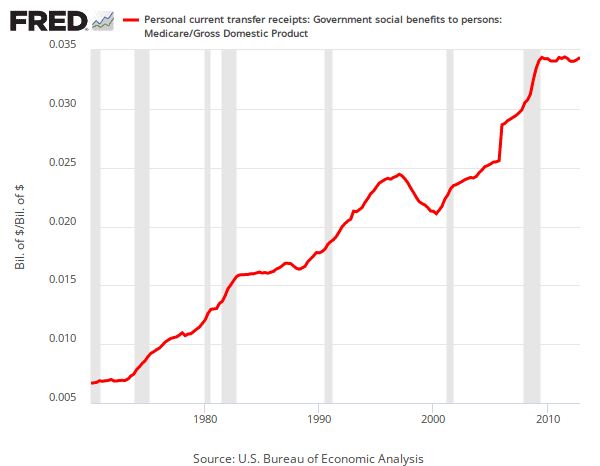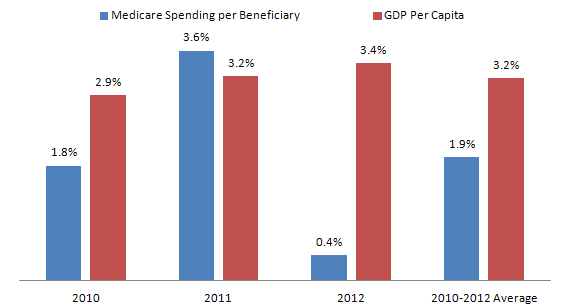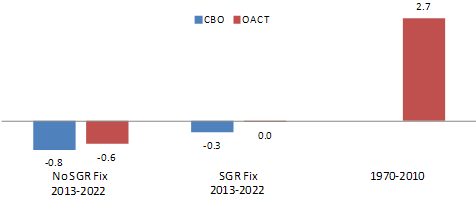ASPE reminds us this week of what other indicators were already telling us: Growth In Medicare Spending Per Beneficiary Continues To Hit Historic Lows.
This tracks well with the observation that Medicare hasn't grown as a percentage of GDP over the past few years:
Government social benefits to persons: Medicare (W824RC1)/Gross Domestic Product, 1 Decimal (GDP)

Also picked up in S&P's health care indices:

Exhibit 1. Annual Increase in Medicare Spending Per Beneficiary and GDP Per Capita
Exhibit 1. Annual Increase in Medicare Spending Per Beneficiary and GDP Per Capita
Note: 2010 and 2011 statistics are calculated on a calendar year incurred-basis. 2012 statistics are calculated on a fiscal year cash-basis, because calendar year incurred-basis data are not yet available.
Source: Medicare spending for 2010 and 2011 from the CMS National Health Expenditures data published in Health Affairs, January 2013; Medicare spending for FY 2012 from Office of the Actuary, CMS; GDP per capita for 2010 and 2011 from the CMS National Health Expenditures data published in Health Affairs, January 2013; GDP per capita for FY 12 calculated from BEA and Census data.
Exhibit 2. Projected and Historical Annual Growth Rates of Medicare Spending Per Beneficiary In Excess of GDP

Source: Medicare Spending Per Beneficiary from 1970-2010 from OACT data on incurred costs; GDP per capita for 1970-2010 from BEA historical data; 10 year future projections and SGR fix data from OACT projections of incurred costs and CBO projections. CBO's SGR fix assumes resetting the SGR Target at 2011 Spending Levels and using GDP +1% in Target. OACTs SGR fix assumes that payment rates will increase at 1% per year.
The slow growth in spending per beneficiary from 2010 to 2012 combined with the projections of spending growth at GDP+0 for 2012-2022 is unprecedented in the history of the Medicare program. If sustained, the slower growth would improve Medicares ability to meet its commitments to seniors and persons with disabilities in future generations.
The Affordable Care Act is an important factor contributing to slow growth in spending per beneficiary in 2011 and 2012, and is the primary cause of the projections of continued slow growth over the next decade. The Affordable Care Act restrains the rate of growth of payments to Medicare Advantage plans, restrains the rate of growth in unit payments to hospitals and other providers, promotes value-based payment systems, and makes major investments to reduce fraud and abuse. The CBO estimated that these provisions of the Affordable Care Act would reduce Medicare spending by $3 billion in 2011, and $10 billion in 2012, with comparable OACT estimates of $6.5 billion in 2011 and $13.5 billion in 2012, or approximately a 1% reduction in spending per beneficiary in 2011, and more than a 2% reduction in 2012. Both the CBO and OACT estimate that the Affordable Care Act will reduce the rate of growth of spending per beneficiary by approximately 1 percentage point per year over the ten year budget window.4,5
In addition, the Affordable Care Act provides CMS the flexibility to implement a wide range of innovations designed to transform the delivery system by paying for value not volume. These innovations include fostering the growth of Accountable Care Organizations, Primary Care Medical Homes, bundled payments for acute and post-acute care, reducing the frequency of readmissions, reducing hospital acquired infections, and reducing fraudulent activity. These innovations are in the early stages of development, but they have the potential for reducing expenditure growth below projected levels.
This tracks well with the observation that Medicare hasn't grown as a percentage of GDP over the past few years:
Government social benefits to persons: Medicare (W824RC1)/Gross Domestic Product, 1 Decimal (GDP)

Also picked up in S&P's health care indices:


